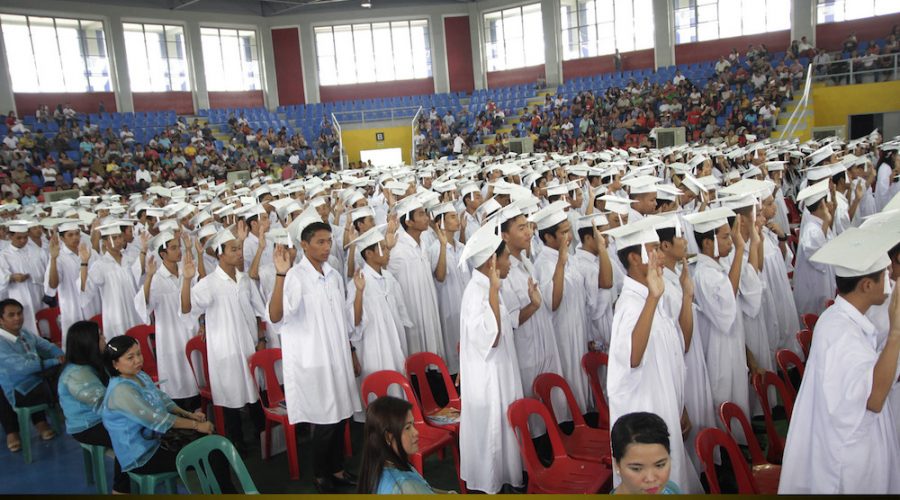BIDA KA!: Trabaho muna sa 2015
Kasabay nito, asahan na rin ang mas matindi pang batikusan, iringan at siraan sa pagitan ng mga posibleng magsabong sa darating na eleksyon.
Abangan na rin na magiging mas mainit na palitan ng akusasyon at kung anu-anong black propaganda ang lalabas laban sa mga kandidato.
Ngunit ang nangyayaring kaguluhang ito sa pulitika ay walang maitutulong upang tugunan ang mga pangunahing pangangailangan ng taumbayan, gaya ng trabaho at kabuhayan para sa mga pamilyang Pilipino.
Maswerte tayo dahil habang hindi pa tayo tatakbo sa 2016, mas makatutuon tayo sa pagpapasa ng mga panukalang makalilikha ng mga trabaho at kabuhayan, at makakabawas sa kahirapan.
Kaya, mga Bida, sa unang semestre ng taon, bibigyang pokus ng ating opisina ang mga sumusunod na panukalang nais makaangat sa estado ng buhay ng karamihan sa ating mga Pilipino: ang Youth Entrepreneurship Bill, Microfinance NGO Act at ang Poverty Reduction through Social Enterprise Bill.
***
Kumbinsido tayo na hindi aarangkada ang tunay na pag-asenso kung hindi matutugunan ang problema ng youth unemployment kaya inihain natin ang Youth Entrepreneurship Bill.
Sa tala ng Department of Labor and Employment (DOLE), sa 2.92 milyong Pilipino na walang trabaho, mahigit 50 porsiyento ay kabataan.
Sa panukalang ito, bubuo ang DepEd, CHED, TESDA at iba pang private institutions ng entrepreneurship at financial literacy modules para sa basic education, tertiary at alternative learning education.
Maglalaan din ang pamahalaan ng pondo para tulungan ang mga kabataan na makapagsimula ng negosyo.
***
Isa pang panukala na nakatakdang talakayin ay ang Microfinance NGO Act, na layong mapalakas ang mga microfinance NGOs na tumutulong sa maliliit na negosyo.
Pakay ng panukala na tulungan ang mahihirap na makakuha ng dagdag na kapital at iba pang serbisyo upang sila’y makapagpatayo ng sariling kabuhayan.
Bibigyan naman ang microfinance NGOs ng karampatang suporta bilang kapalit sa tulong nila sa maliliit na negosyo.
***
Ang panghuli nating panukala para maibsan ang kahirapan ay ang Poverty Reduction through Social Enterprise (PRESENT) Bill na layong tumulong sa pagbaba ng 16.6 na porsiyento ng kahirapan sa bansa pagdating ng 2016.
Ang social enterprise (SE) ay isang organisasyon na may misyong tumulong sa mahihirap na komunidad gamit ang pagnenegosyo at hindi lamang sa donasyon o charity.
Tumutulong ang mga negosyo sa mahihirap na kumita rin sila sa pagkakaroon ng sarili nilang maliliit na negosyo.
Mahalagang maisulong natin ang mga negosyong magbibigay sa mahihirap ng tuluy-tuloy na kabuhayan na tutugon sa pangangailangan at makakapag-angat sa kanilang kalagayan.
***
Ito ay malaking hamon sa ating lahat. Sa gitna ng ingay at bangayang pampulitika, iniimbitahan ko kayo na samahan ako sa pagsulong sa mga panukalang ito na makatutulong sa pagbura sa kahirapan sa lipunan.
Nais nating maisabatas ang mga ito bago mag-eleksyon upang magkaroon pa ng mas maraming pagkakataong umasenso ang bawat pamilyang Pilipino.
Sa tulong ng trabaho, kabuhayan at karampatang suporta para sa lahat, tiwala akong walang maiiwan tungo sa kaunlaran.
First Published on Abante Online


Recent Comments